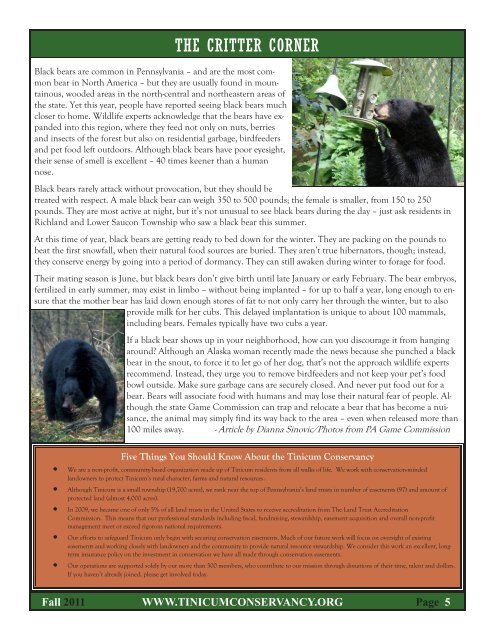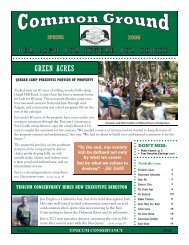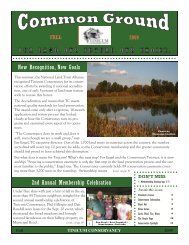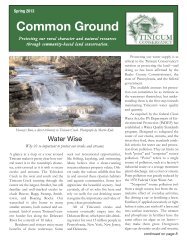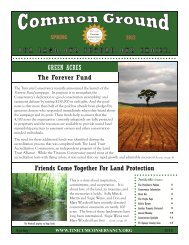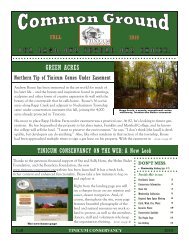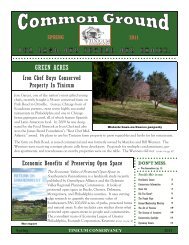Newsletter-Fall '11FINALFINAL-REALLY - Tinicum Conservancy
Newsletter-Fall '11FINALFINAL-REALLY - Tinicum Conservancy
Newsletter-Fall '11FINALFINAL-REALLY - Tinicum Conservancy
Create successful ePaper yourself
Turn your PDF publications into a flip-book with our unique Google optimized e-Paper software.
THE CRITTER CORNER<br />
Black bears are common in Pennsylvania – and are the most common<br />
bear in North America – but they are usually found in mountainous,<br />
wooded areas in the north-central and northeastern areas of<br />
the state. Yet this year, people have reported seeing black bears much<br />
closer to home. Wildlife experts acknowledge that the bears have expanded<br />
into this region, where they feed not only on nuts, berries<br />
and insects of the forest but also on residential garbage, birdfeeders<br />
and pet food left outdoors. Although black bears have poor eyesight,<br />
their sense of smell is excellent – 40 times keener than a human<br />
nose.<br />
Black bears rarely attack without provocation, but they should be<br />
treated with respect. A male black bear can weigh 350 to 500 pounds; the female is smaller, from 150 to 250<br />
pounds. They are most active at night, but it’s not unusual to see black bears during the day – just ask residents in<br />
Richland and Lower Saucon Township who saw a black bear this summer.<br />
At this time of year, black bears are getting ready to bed down for the winter. They are packing on the pounds to<br />
beat the first snowfall, when their natural food sources are buried. They aren’t true hibernators, though; instead,<br />
they conserve energy by going into a period of dormancy. They can still awaken during winter to forage for food.<br />
Their mating season is June, but black bears don’t give birth until late January or early February. The bear embryos,<br />
fertilized in early summer, may exist in limbo – without being implanted – for up to half a year, long enough to ensure<br />
that the mother bear has laid down enough stores of fat to not only carry her through the winter, but to also<br />
provide milk for her cubs. This delayed implantation is unique to about 100 mammals,<br />
including bears. Females typically have two cubs a year.<br />
If a black bear shows up in your neighborhood, how can you discourage it from hanging<br />
around? Although an Alaska woman recently made the news because she punched a black<br />
bear in the snout, to force it to let go of her dog, that’s not the approach wildlife experts<br />
recommend. Instead, they urge you to remove birdfeeders and not keep your pet’s food<br />
bowl outside. Make sure garbage cans are securely closed. And never put food out for a<br />
bear. Bears will associate food with humans and may lose their natural fear of people. Although<br />
the state Game Commission can trap and relocate a bear that has become a nuisance,<br />
the animal may simply find its way back to the area – even when released more than<br />
100 miles away. - Article by Dianna Sinovic/Photos from PA Game Commission<br />
Five Things You Should Know About the <strong>Tinicum</strong> <strong>Conservancy</strong><br />
• We are a non-profit, community-based organization made up of <strong>Tinicum</strong> residents from all walks of life. We work with conservation-minded<br />
landowners to protect <strong>Tinicum</strong>’s rural character, farms and natural resources.<br />
• Although <strong>Tinicum</strong> is a small township (19,700 acres), we rank near the top of Pennsylvania’s land trusts in number of easements (97) and amount of<br />
protected land (almost 4,000 acres).<br />
• In 2009, we became one of only 5% of all land trusts in the United States to receive accreditation from The Land Trust Accreditation<br />
Commission. This means that our professional standards including fiscal, fundraising, stewardship, easement acquisition and overall non-profit<br />
management meet or exceed rigorous national requirements.<br />
• Our efforts to safeguard <strong>Tinicum</strong> only begin with securing conservation easements. Much of our future work will focus on oversight of existing<br />
easements and working closely with landowners and the community to provide natural resource stewardship. We consider this work an excellent, longterm<br />
insurance policy on the investment in conservation we have all made through conservation easements.<br />
• Our operations are supported solely by our more than 500 members, who contribute to our mission through donations of their time, talent and dollars.<br />
If you haven’t already joined, please get involved today.<br />
<strong>Fall</strong> 2011 WWW.TI�ICUMCO�SERVA�CY.ORG Page 5


